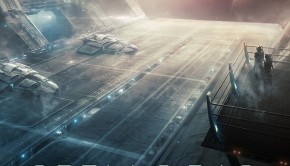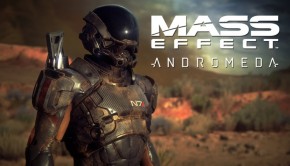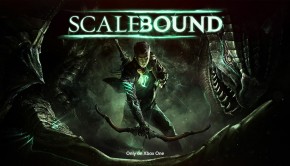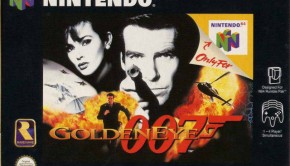Christopher Lennertz Interview: Sonic Fuel
Christopher Lennertz is an American Emmy-nominated game composer who has worked on some of the biggest franchises in gaming, among them Medal of Honor, Mass Effect, The Sims and James Bond. In addition to this, Lennertz’ work on original titles such as Gun and Warhawk has found great acclaim among score fans for their rich orchestral stylings. Lennertz has also steadily built a career in Hollywood, scoring major television series such as Supernatural and Revolution, alongside hit box office comedies such as Alwin and the Chipmunks and Horrible Bosses.
In this in-depth interview, Lennertz focuses on his recent work in the gaming industry. In particular, he talks about his approach to scoring his most recent game soundtrack Starhawk and its spiritual predecessor Warhawk. He discusses his fondness for working on franchises, what his robust and spirited style of orchestral compositions brought to Mass Effect 3, and how he brought classical and pop elements together on The Sims 3: Pets.
Interview Credits
Interview Subject: Christopher Lennertz
Interviewer: Simon Elchlepp
Editor: Simon Elchlepp
Coordination: Anne Roever, Simon Elchlepp, Chris Greening
Support: Tim Wynn
Interview Content
Simon: Christopher Lennertz, thanks for taking the time today to talk about your work. Since many of our readers will be already familiar with your film and television works, let’s jump right into your video game works, with Warhawk. At a time when many war-themed action games received orchestral/electronic hybrid soundtracks, you went with a more traditional, purely orchestral score. What was the reason for this stylistic choice? Considering that similar recent games received equally exuberant orchestral music, do you think there is something about flight action games that inspires composers to create such buoyant scores?

Christopher Lennertz: Absolutely. I think that, in general, most people associate the feeling of flight with soaring melodies and rising and falling runs in woodwinds and strings. Even before Wagner’s Ride of the Valkeries, classical music has always tried to mimic the feeling of flight and speed with similar orchestral gestures.
One of the main reasons that we decided to use this approach specifically on Warhawk was that Dylan Jobe, our fearless director, is a huge fan of orchestral melody… and perhaps most importantly, our sound effects were going to be so aggressive and piercing that to have competing electronics made no sense. The rich and smooth texture of the orchestra would be able to exist side by side with the sound design in the game.
Simon: Warhawk turned some heads at the time of its release, as it turned out to drop the single-player campaign and instead solely focused on multiplayer modes. This focus on multiplayer modes also eliminates most of the narrative clues that come with a single-player campaign. Did this impact your score and in how far did this pose a particular challenge when writing the music for Warhawk? Given its high-octane approach, how did you put together Warhawk‘s music for the album release?
Christopher Lennertz: Interestingly enough, the decision to drop the single player aspect of the game was made after the score was complete, so it was only in implementation that any adjustments could be made. I think in general, some of the more thematic elements — especially in terms of the battle with Saar and Kreel — were either not used or used in a less important way. Nonetheless, when it was written, the entire story exists within the musical score.
The album was actually put together by the music department over at Sony. They did a terrific job trying to sequence everything in such a way that the music made sense dramatically, but also let things build as the story might progress to a player. Clint Bajakian was with us when we recorded, so his familiarity with the score was integral to putting out a successful soundtrack release.
Simon: For Starhawk, you have changed the score’s orchestration considerably from Warhawk and added a number of instruments that create a heavier feel and at the same time give the score a certain Western twang. What was the motivation behind these changes and how do they fit the game’s shift to an outer-space scenario in your view?
Christopher Lennertz: While the team and many of the flight elements came from the Warhawkuniverse, Dylan was very insistent that this game stand on its own. He came up with the idea of a space western and we all jumped at the chance to bring it to life. I studied with Elmer Bernstein (The Magnificent Seven) and have always been a huge admirer of westerns and the rich musical history that goes with them.

Once Dylan and the Sony team briefed me on the gunslinger aspect of the main character, as well as the tragic lost brother storyline, I knew that I could really sink my teeth into the western elements. I wanted the organic flavour of the dobro, the harmonica, and the slide guitar, but tried to balance all of that with ethnic elements like Tuvan throat singers, Bansuri, Taiko drums, and eastern European vocal clusters. On top of all this, we expanded upon Warhawk‘s palette by adding electronic percussion, processing, and searing metal guitars to depict the vicious nature of the Starhawk universe.
Simon: With the inclusion of several non-classical elements on Starhawk, how did you ensure that they worked seamlessly hand in hand with the orchestral components, both composition-wise and later during the recording and mix of the music?
Christopher Lennetz: I knew that combining the various lead instruments with the orchestra might pose a challenge, so we had to record the soloists on their own and even hold different sessions for strings, brass, and percussion… allowing us to mix the different instruments afterwards to create the final “Starhawk Orchestra”.
Composition wise, I really try to treat all instruments equally, regardless of whether they are traditionally from a western orchestra or electronic or amplified. The idea is to envision them all together on a giant concert stage and let that inform the choices in terms of solos, ranges, registers, etc.
Simon: With a soundtrack like Starhawk, in how far do you think does your experience as a Hollywood composer influence the creative outcome, or is the music rather a result of having gathered experience on how to serve a project? Did the inclusion of strategy elements into the gameplay impact your music?
Christopher Lennertz: Having scored a number of hit films and television shows does help me in the way that any experience might… especially in terms of handling the pressure of deadlines and getting the very best players for the proper parts. But at the end of the day, regardless of the medium, a story is a story… and characters are the key. I always approach movies and games the same way: by asking “How can I help my director and/or producers tell their story that makes it the most compelling and enjoyable for the audience or players?” That’s it really — nothing else matters.
Simon: In your career as a game composer, you have worked on an impressive number of franchises, including Medal of Honor, James Bond, and The Simpsons, following in the footsteps of renowned composers such as John Barry and Michael Giacchino. Is there a particular reason — creative or otherwise — for this focus on franchise titles, or is it just something that came about naturally? Is it a stimulating challenge to write music that both suits a particular franchise’s soundworld and still expresses your personal ideas and style?
Christopher Lennertz: In both movies and games, I’ve always loved franchises and serials. From Star Wars and The Godfather, to Indiana Jones and Superheroes. To me, characters and stories that are so big and so exciting that they require multiple trips to the theatre to experience them fully are the greatest forms of entertainment. I think that anyone who gets to know me realises this and would therefore, perhaps, think I’m a good fit to be a part of telling some of those stories.

As far as following the amazing composers you mentioned, it was an honour, a gift, and a little scary. Especially with something like Bond, where a couple of very talented folks have been critically bashed for not living up to the series… But I’ve been such a huge 007 fan forever, I just jumped at the opportunity. As far as fitting in the soundworld of a franchise… to me, writing a big brassy action cue in the style of John Barry is as close to putting on Connery’s jetpack and grabbing a Walther PPK as I’ll probably ever get. So I was thrilled to do it!
Simon: Displaying your versatility once more, you recently also scored The Sims 3: Pets. With more than two dozen album releases containing various musical styles, the universe of The Sims music is about as sprawling as Western game franchises get. What was your stylistic direction on this game and in how far did you follow the direction of Steve Jablonsky’s score for The Sims 3?
Christopher Lennertz: I did use the Sims theme quite a bit where directed, but because of the subject matter, was able to do my own thing a bit. The animal aspect allowed for some very interesting soloist work and the changes in locale also gave me some opportunities to explore some stylistic combinations that I hadn’t before.
Simon: Different to Starhawk, on The Sims 3: Pets you not only include non-classical instruments into a mostly classical score, but also mix two different musical styles, orchestral and pop. What do you think are the elements that hold both soundworlds — classical and pop — together on the title? Is it the choices of timbres and instruments, the rhythms you use or something else? And in how far do feel that your work on The Sims 3 Pets is a continuation of your similarly-styled work on many comedy movie scores?
Christopher Lennertz: I do think in most cases, pop and rock elements can blend with orchestra… especially when one considers that “classical” music was merely pop music in the last few centuries. I think that, especially in comedies and family films and games, there is an opportunity to let established musical genres and style cohabitate to create something new. Hopefully, this gives the audience, or player an energy and a license to laugh and enjoy a scene. I’ve definitely been doing a lot more of this in my recent film work and it’s always fun to surprise people with a combination that they weren’t expecting!
Simon: One of the franchises that you entered two years ago was Mass Effect, with your scores for the Mass Effect 2 DLCs Lair of the Shadow Broker and Overlord. Could you gives us some insight into how your involvement with the Mass Effect series came about and what interested you about writing for the Mass Effect games? If I remember correctly, your scores for the Mass Effect franchise are your first foray into the science fiction genre. As you have proven your talent at creating music in many different genres before, was this a relatively easy transition or did it pose its own particular challenges?
Christopher Lennertz: My intro to Mass Effect came by way of an introduction by EA’s head of music, Steve Schnur to Rob Blake, the series’ audio director. I liked the idea of blending some classic synth textures with orchestral elements and also going full force into a completely Sci Fi universe. Considering my childhood, I was happy to explore this space musically!
The transition to Sci Fi was an easy one, but I did have to do a bit of homework. I knew that fans of the franchise were very critical and I wanted to make sure I was giving them what they wanted, while still lending my voice to the series. The biggest challenge was that I had to dust off some of my more classic analog synth patches to keep with the sonic landscape of the game. Not a lot of producers ask for the Vangelis style textures, but it was fun to get into that world a bit.

Simon: Your compositions on the Mass Effect 3 soundtrack have a militaristic energy that’s reminiscent of works like Warhawk and your Medal of Honor scores. Did you feel that working on the titles allowed you to retain your established vigorous style for these military games, while giving the same style a new sound that was appropriate for a science fiction score?
Christopher Lennertz: I think so. I was fortunate enough to work for two amazing composers early in my career: the amazing Basil Poledouris, who scored Conan, Robocop, and Hunt for Red October, and the wonderful Michael Kamen, who did Die Hard, Robin Hood, and Band of Brothers… so it’s easy to see where my musical tendencies lie.
I just adore the escape of big thematic action scores that lets everyone in the audience feel like they can fly… or they can save the day, or win the war. This is what I love about games, movies, storytelling in general. This is why I do what I do, so yes, it is always great to be able to add what I feel is a strength of mine to a well loved series.
Simon: Mass Effect 3 was a collaboration between several composers, including well-known artists such as Sam Hulick, Cris Velasco and Sascha Dikicyan and yourself. How did the collaborative process between the composers take part during the creation of Mass Effect 3‘s score and how was the decision made who scores which parts of the game?
Christopher Lennertz: As much as I respect the other composers and love what they did for the game, we all pretty much worked simultaneously on our own. There was a huge time crunch and we didn’t have the opportunity to collaborate much, but I did get to hear a few things that Clint and Sam did… and was able to take them into account when writing my cues.
The audio director Rob Blake was responsible for assigning the cues, and he did a fantastic job of keeping the music divided in a way that allowed us all to follow our individual storylines through in order to give the game the continuity that it needed. He made the process run very efficiently.
Simon: To finish things off, you’ve been involved in two charity albums recently. On Novum Initium, you and Tim Wynn contributed “Bullseye”. Were you given any instructions in regards to what mood or style to write in, and how your piece would fit into the album as a whole?
Christopher Lennertz: “Bullseye” was an unreleased track that Tim and I did together for The Punishera few years back. Sam and Jason approached us about getting involved and we both said yes right away. We wanted to add a track that was fun and not dour or sad in any way. While the cause of the CD may have been serious, the audience loves kick-ass game music, so in that spirit… what better way to send a positive message and helping hand, than to try and raise money for our fellow composers in need? You can listen to the track here.
I also recently organised the charity project A Symphony of Hope: The Haiti Project with Steve Schnur, featuring 25 big name film and game composers. It has a unique concept that you can read abouthere.

Simon: Many thanks for your time today, Christopher Lennertz. Is there anything else you’d like to say about Starhawk or your work in general? Do you have any messages to readers from around the world?
Christopher Lennertz: Only thanks for watching, listening, and playing!!!
Posted on June 1, 2012 by Simon Elchlepp. Last modified on February 27, 2014.














